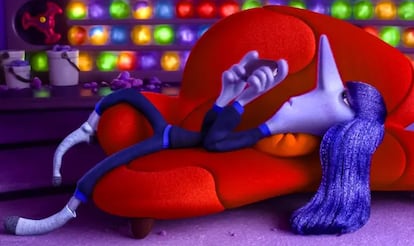How to cope with ennui, the ‘new’ feeling that Pixar addresses in ‘Inside Out 2′
The inclusion of this unique emotion in the sequel to the successful Disney film has sparked curiosity about its meaning and origin. Two experts explain its symptoms and scope, as well as tips for coping with it if we experience it in our lives

It has become a buzzword in recent days. “What is ennui?” ask dozens of users unfamiliar with this word of French origin, whose presence on social media is only increasing. Although its growing virality comes from long ago, the release of the trailer of the new Disney Pixar movie, the sequel to the successful Inside Out, has piqued people’s curiosity about the term. The movie will include four new emotions as part of the teenage protagonist Riley’s life. In addition to popular emotions like Shame, Anxiety and Envy, there will also be Ennui, a violet-colored teenager with an apathetic personality and a languid gaze directed at her cell phone. Played by actress Adele Exarchopoulos (Blue Is the Warmest Color), Ennui answers the other characters’ confusion about her name in a French accent: “It’s what you would call boredom.”
A lack of knowledge of the word has caused bewilderment among many users. Disney’s commitment to highlighting adolescent apathy is not new. Back in 2015, when Inside Out was released, those responsible confessed that they had characterized up to 26 emotions and that one of those that was about to enter the final quintet — along with Joy, Sadness, Anger, Disgust and Fear — was Ennui. Would translating the term as “boredom” oversimplify a polymorphic word with extensive and ancient roots in French culture? What is so special about ennui that Disney has decided to export this emotion to a global audience?
“Ennui is an emotion that manifests itself physiologically as a drop in energy and generalized drowsiness and, psychologically, as a feeling of emptiness and weariness caused by idleness and a change in the perception of time, which seems to drag on,” psychologist Laurence Parnier explains. She considers ennui to be a universal and essential emotion. “It appears when an individual is unable to perform a satisfying activity, in a context that is not very stimulating and in which a lack of commitment, interest, involvement and meaning emerges.” Christine Lebriez, a psychologist and coach, has worked directly with patients showing clear symptoms of this condition. “They often describe a persistent feeling of boredom, lack of interest in daily activities and a loss of motivation in their life,” she notes. The expert is not surprised by the emotion’s inclusion in the upcoming Disney movie: “Boredom is more common than we might imagine in modern society. Continued exposure to technology and constant overstimulation may contribute to this phenomenon, as well as the fact that productivity, digital connection and entertainment are overrated in today’s society. It is a state that is very typical of the times we live in.”
Ennui gained popularity and significance in French culture during the 19th century, especially in literature and politics. In 1839, former French Foreign Minister Alphonse De Lamartine warned Parliament that “France is a bored country.” Baudelaire also wrote about emotion, and the poet Théophile Gautier said that “barbarism comes before ennui.” George Steiner suggested that the unbearable tedium that had gripped France and Europe, devoid of epic and conflict until the early 20th century, was one factor that ultimately drove the First World War. Halfway between pathology and a poetic and romantic expression, ennui also manifests itself in the protagonists of novels such as The Regent’s Wife and Madame Bovary and evolves into the existential emptiness of the antiheroes of Kafka, Sartre and Camus.
But far from being exclusive to the French spirit, this phenomenon can manifest itself in people from different cultures and social contexts. As Lebriez asserts: “Feelings of boredom and lack of motivation are common experiences that can arise at any time in our lives. The millennial generation is not immune and can also experience ennui due to the pressure to succeed, job uncertainty and incessant exposure to technology and social media. But it is important to note that boredom does not affect all individuals of this generation — or any other — in the same way, as experiences and perceptions vary according to personal factors and context.”
The data back up Lebriez’s assertion. In 2016, a study revealed that two out of three British millennials (people born between the mid-1980s and 2000) felt “bored of life.” In the same year, Pope Francis warned about the growing number of “bored and boring” young people who seemed to have “retired before their time.” ‘Procrastinate,’ which is becoming increasingly popular in today’s lexicon, was one of the candidates for word of the year 2018 by Fundeu. If a well-honed marketing strategy has managed to make terms like saudade and hygge cross borders to become lifestyle philosophies that can sell millions of books worldwide, will ennui become the new trendy concept once Disney has introduced it to millions of viewers?
The experts note that experiencing ennui does not have to be a bad thing and that, like any other emotion, it has a function and purpose if we apply positive thinking. “It’s a signal that we can take advantage of to improve,” concludes Parnier. “The untrained mind doesn’t like to be alone with itself. So, verbalize what you would like in your heart of hearts right now, but can’t get: what am I missing? What would I like to feel good about? What would thrill me? What could I do to lift my mood? By asking yourself these questions, you will be able to make positive use of this unpleasant emotion and know what to do to feed your need to feel alive.”
Sign up for our weekly newsletter to get more English-language news coverage from EL PAÍS USA Edition
Tu suscripción se está usando en otro dispositivo
¿Quieres añadir otro usuario a tu suscripción?
Si continúas leyendo en este dispositivo, no se podrá leer en el otro.
FlechaTu suscripción se está usando en otro dispositivo y solo puedes acceder a EL PAÍS desde un dispositivo a la vez.
Si quieres compartir tu cuenta, cambia tu suscripción a la modalidad Premium, así podrás añadir otro usuario. Cada uno accederá con su propia cuenta de email, lo que os permitirá personalizar vuestra experiencia en EL PAÍS.
¿Tienes una suscripción de empresa? Accede aquí para contratar más cuentas.
En el caso de no saber quién está usando tu cuenta, te recomendamos cambiar tu contraseña aquí.
Si decides continuar compartiendo tu cuenta, este mensaje se mostrará en tu dispositivo y en el de la otra persona que está usando tu cuenta de forma indefinida, afectando a tu experiencia de lectura. Puedes consultar aquí los términos y condiciones de la suscripción digital.









































